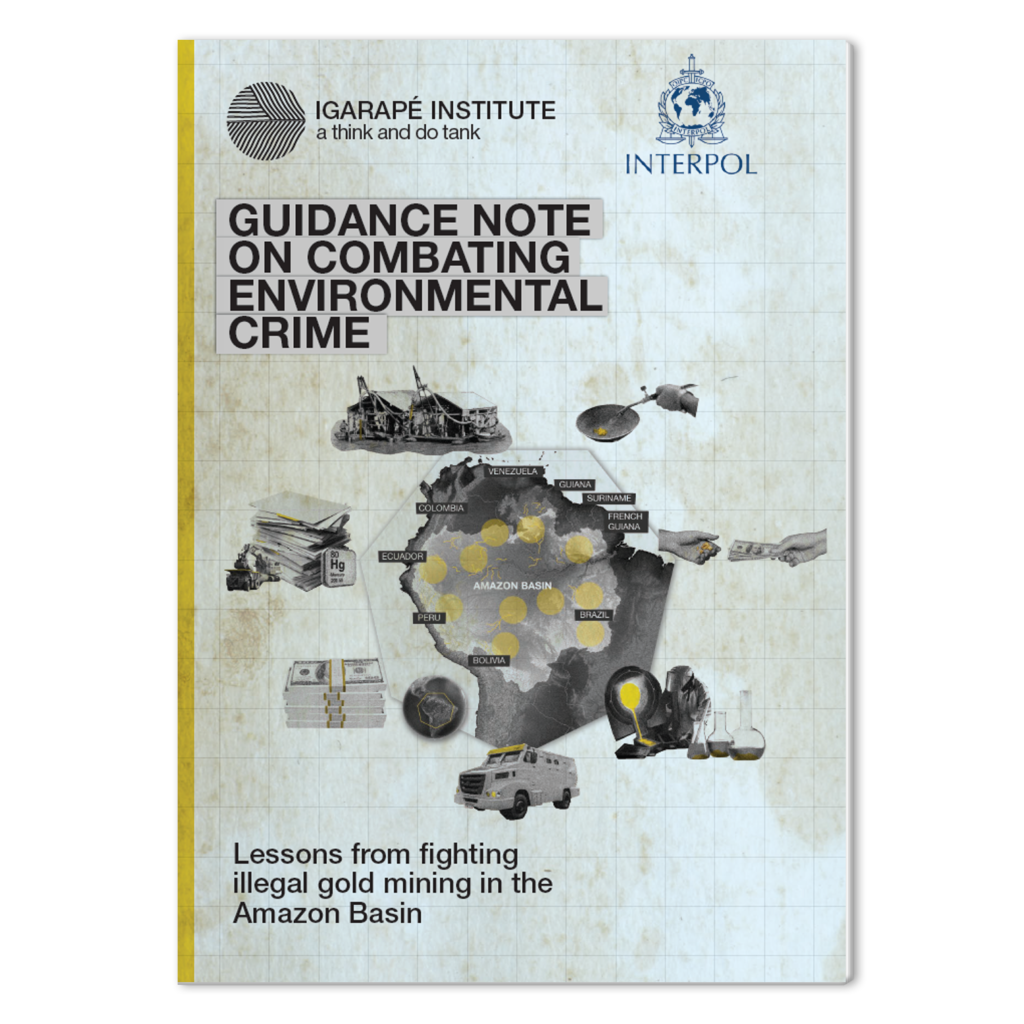
O Instituto Igarapé utiliza cookies e outras tecnologias semelhantes para melhorar a sua experiência, de acordo com a nossa Política de Privacidade e nossos Termos de Uso e, ao continuar navegando, você concorda com essas condições.
Climate Security > Illegal Gold Mining in the Amazon


Source: Rede Amazônica de Informações Socioambientais

source: Mapbiomas 2021

● Immediately revitalize and fortify Ethno-Environmental Protection Baselines (BAPEs) and Indigenous Affairs Agency (Funai) health outposts.
● Establish a dedicated program for defenders of the Amazon, adapted to varying regional circumstances and contexts (including indigenous defenders at illegal mining sites).
● Implement an integrated and participatory Protection and Inspection Plan on indigenous territory and in conservation zones, with federal oversight (Federal Police, Ibama, CENSIPAM, Funai and ICMBio).
● Regulate Funai’s administrative police powers, enabling it to inspect areas under its jurisdiction, levy administrative sanctions and punish illicit actions on indigenous lands. Funai should be empowered to write up infractions, embargo illegal activities on indigenous lands, seize materials used in illicit activities on indigenous territory, among other actions.
Aumento da transparência e rastreabilidade do ouro:
● Revoke the article of presumption of good faith (Law no. 12.844, dated 2013) pertaining to purchase and sale of gold. This article, by which buyers rely on the veracity of information provided by producers and vendors, is incompatible with the evidence of multiple irregularities (whether through omission or commission) which currently taint the sale of gold in Brazil.
● Ensure that the National Mining Agency (ANM) and the Brazilian Central Bank improve systems for the regulation, inspection and control of mining and sale of minerals in Brazil, including through an electronic system to collect and systematize data on the origin and transport of minerals (especially gold), and then making this information accessible in receipts and registries for all purchases and sales.
● Encourage the adoption of risk analysis and crime prevention measures for Amazon gold transactions across the gold supply chain, including by vendors and buyers, and especially brokers, but also by jewelers outside the Amazon basin and abroad.
● Improve traceability and transparency throughout the supply chain, while also increasing intelligence capabilities to detect large scale financial flows into illegal environmental activity.
Improving the legal framework for mining permits:
● Update the regulatory framework for issuing artisanal mining permits (PLG) to include improved socio-environmental controls.
● Condition National Mining Agency (ANM) issuance of artisanal mining permits (PLGs) only to petitioners able to dcoument the size of the prospective mining site, the intended mining methods and the expected productivity of the mine.
● Stipulate that the mining authority (ANM) cancel mining licenses and preliminary mining permits on sites that encroach on protected lands and family farms.
● Strengthen systems to prevent Money Laundering for Environmental Crimes by permanently updating the list of persons required to report financial activities and risk evaluation assessments designed to help COAF detect irregularities and gather information on suspected environmental crimes and their direct or indirect perpetrators. COAF must undertake strategies to monitor financial institutions involved in the purchase and sale of gold, including asset management brokers, to ensure that they adhere to “know-your-client” practices and file regular commercial transaction reports.
● Increase the list of persons required to report to COAF and file risk analysis reports for environmental crimes. Financial institutions should be encouraged to detect and report instances of fraud, corruption and money laundering associated with environmental crimes.
● Tighten monitoring of purchase and sale of essential materials used throughout the commodities and forest resources supply chains, such as aviation fuel and heavy machinery.
● Create a registry of heavy equipment, as Colombia has done since 2015. (Under Resolution 1.068;2015, the Colombian Ministry of Transportation requires users of heavy machinery to declare their equipment through the National Transportation Registry’s RUNT System, and deploy them with GPS equipment to enhance traceability.) In Brazil, machinery used for excavating alluvial gold – including barges, tractors, backhoes, dredges and bulldozers – can cost between R$60,000 (around US$ 11,000) and R$2,000,000 (US$370,000)
● Invest in the financial and human resources to ensure that the national mining authority (ANM) carries out routine inspection at mines in the Legal Amazon region. This process includes cross checking claims through satellite geolocational data required by Brazil’s rigorous Yearly Mining Registry (which reports national mineral production) to flag and eventually shut down unreported mining in the region.
● Strengthen operational command and control capacity to stop deforestation and combat environmental crimes. These efforts rely critically on building information sharing for coordinating intelligence and operational planning among multiple governing institutions: Ibama, Funai, ICMBio, Federal Police, the Federal Prosecutors’ Office, the National Intelligence Agency, the Armed Forces, COAF and the Brazilian Central Bank.
● Step up control of national air space by the Brazilian Air Force, particularly in the case of aircraft flying below radar, and inhibit air traffic to illegal mining sites on Yanomami indigenous lands.
● Strengthen legal and administrative instruments to foster tighter control over the use of mercury for gold mining, while ensuring rigorous analysis of the metal’s social and environmental impact on local communities, until such time as mercury is eliminated from the mining cycle. Under the Minamata Convention of 2013, to which Brazil is a signatory, the country is committed to phasing out the use of mercury in mining altogether.
● Reinforce regional and international mechanisms for technical, operational, investigative and judicial cooperation, particularly as it pertains to combating transnational sale of gold illegally sourced in the Amazon. International cooperation is essential to improve national technological capacity, operationality and traceability of illegal Amazon gold. Stopping illicit gold mining requires pursuing the links connecting Brazilian operations to neighboring countries, while also enhancing cross border capacity to investigate and prosecute the networks of trafficking and financial crimes committed regionally and globally across the entire gold supply chain


O Instituto Igarapé utiliza cookies e outras tecnologias semelhantes para melhorar a sua experiência, de acordo com a nossa Política de Privacidade e nossos Termos de Uso e, ao continuar navegando, você concorda com essas condições.

